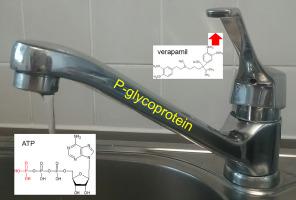Biochimica et Biophysica Acta (BBA) - General Subjects ( IF 3 ) Pub Date : 2021-05-12 , DOI: 10.1016/j.bbagen.2021.129915 Xuexin Gao 1 , Doriane Aguanno 1 , Mary Board 2 , Richard Callaghan 1

|
Background
P-glycoprotein (P-gp) is a prevalent resistance mediator and it requires considerable cellular energy to ensure ATP dependent efflux of anticancer drugs. The glycolytic pathway generates the majority of catabolic energy in cancer cells; however, the high rates of P-gp activity places added strain on its inherently limited capacity to generate ATP. This is particularly relevant for compounds such as verapamil that are believed to trap P-gp in a futile transport process that requires continuing ATP consumption. Ultimately, this leads to cell death and the hypersensitivity of resistant cells to verapamil is termed collateral sensitivity.
Results
We show that the addition of verapamil to resistant cells produces a prominent reduction in ATP levels that supports the idea of disrupted energy homeostasis. Even in the absence of verapamil, P-gp expressing cells display near maximal rates of glycolysis and oxidative phosphorylation, which prevents an adequate response to the demand for ATP to sustain transport activity. Moreover, the near perpetually maximal rate of oxidative phosphorylation in the presence of verapamil resulted in elevated levels of reactive oxygen species that affect cell survival and underscore collateral sensitivity.
Conclusions
Our results demonstrate that the strained metabolic profiles of P-gp expressing resistant cancer cells can be overwhelmed by additional ATP demands.
General significance
Consequently, collateral sensitising drugs may overcome the resistant phenotype by exploiting, rather than inhibiting, the energy demanding activity of pumps such as P-gp.
中文翻译:

利用药物外排泵的代谢能量需求提供了一种克服癌症多药耐药性的策略
背景
P-糖蛋白 (P-gp) 是一种普遍的耐药介质,它需要大量的细胞能量来确保抗癌药物的 ATP 依赖性外排。糖酵解途径在癌细胞中产生大部分分解代谢能量;然而,P-gp 活性的高速率对其固有的有限生成 ATP 的能力施加了额外的压力。这与维拉帕米等化合物特别相关,这些化合物被认为会在需要持续消耗 ATP 的无用转运过程中捕获 P-gp。最终,这会导致细胞死亡,并且耐药细胞对维拉帕米的超敏反应被称为附带敏感性。
结果
我们表明,将维拉帕米添加到抗性细胞中会显着降低 ATP 水平,这支持破坏能量稳态的想法。即使在没有维拉帕米的情况下,表达 P-gp 的细胞也显示出接近最大的糖酵解和氧化磷酸化速率,这阻止了对 ATP 需求的充分反应,以维持运输活动。此外,在维拉帕米存在的情况下,氧化磷酸化的接近永久最大速率导致活性氧水平升高,从而影响细胞存活并强调附带敏感性。
结论
我们的结果表明,表达 P-gp 的抗性癌细胞的紧张代谢谱可能会被额外的 ATP 需求所淹没。
一般意义
因此,侧支致敏药物可以通过利用而不是抑制泵(如 P-gp)的能量需求活动来克服耐药表型。



























 京公网安备 11010802027423号
京公网安备 11010802027423号